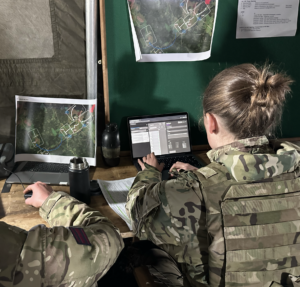About cookies on this site Our websites require some cookies to function properly (required). In addition, other cookies may be used with your consent to analyze site usage, improve the user experience and for advertising. For more information, please review your options. By visiting our website, you agree to our processing of information as described in IBM’sprivacy statement. To provide a smooth navigation, your cookie preferences will be shared across the IBM web domains listed here.
Client Stories
MINISTRY OF DEFENCE: Project Minerva Fighting Intelligently
28 June, 2023 | Written by: Aderinsola Okunoren, Christopher Burton, and Shivali Mistry
Categorized: Client Stories
Share this post:
Explore how the Battle Group Engineers leveraged the benefits of IBM’s Automated Solutions to bring Project Minerva to life.
This blog describes the journey of how IBM and MOD joined forces to create Project Minerva; from engaging with IBM Consulting to partnering with IBM Client Engineering. A mission like no other, this digital transformation led the teams to design, develop and deploy a prototype to help the battle group engineers prepare for the ultimate battle.
Firstly, what are Battle Group Engineers?
The Battle Group Engineers (BGE) are Royal Engineers (informally know as ‘Sappers’), who provide operational and technical advice to fighting formations of the British Army around the world. Whether it be day or night, rain or shine, they have a responsibility to plan and task engineering services within a military area of operation. Examples of some of the services includes providing Airfield support, Naval/Port facilities support, infrastructure advice and support to Humanitarian Aid Disaster Relief (HADR).
The BGE Vision
The journey began with the BGE’s discussing one of the hot topics in today’s world… Digital Transformation, and how this would bring benefits into their operations. To revolutionise the BGE role, they had to start somewhere and here’s what the clients had to say:
Major James Moloney, Project Sponsor, MOD:
“Early 2022, IBM joined a military engineer urban visualisation workshop in east London. They demonstrated a range of open-source information gathering and refining techniques we hadn’t considered. Consequently, we asked Harriet, Dave and Alan (from IBM Consulting) if they would help us automate BGE tasks. After initial consultation, the wider IBM team engaged and hosted a workshop with 10 military engineers diving into the challenges of the role. IBM then observed training, they learnt military engineer fundamentals and we introduced them to the planning process. Then they set about building a prototype. From the initial demonstration, it was evident they had understood the BGE pain points and through MINERVA could exponentially improve performance. The investment they made in understanding the problem has certainly paid off.”
How IBM Consulting helped pave the way into the digital world
The Sappers approached IBM Consulting to help them transform their internal operations. IBM Consulting initiated the collaboration through events that would help to achieve the purpose of adopting technology to fulfil their digital transformation journey.
Harriet Johnston, Project Manager, IBM Consulting:
“I was lucky to first meet James in early 2022 as we prepared to be part of the visualisation workshop held in Ilford in March 2022. In the run up to this, I had regular calls with James to agree what we could bring to the demo by exploring the challenge of Digitisation and reducing the cognitive burden of decision making. I worked with a small team within IBM to build a small prototype for the workshop. The prototype shows a digitised view of Ilford using structured and unstructured engineering relevant data to enable a search, visualisation and analysis of the data. This was a fantastic day and led to us thoroughly enjoying working closely with the BGEs and learning more on the challenges they faced.”
Further Acceleration with Client Engineering
To establish further digital breakthroughs, IBM Consulting partnered with IBM Client Engineering (CE), a team which takes a bold, comprehensive approach to innovation and transformation. By adopting core principles of Design Thinking, Lean and Agile, together to build, measure, and scale new ideas, results in impactful changes to businesses. The aim of CE is to achieve speed-to-value and by doing this, the team co-creates and co-executes the solution with clients exclusively.
David Milner, Associate Partner, IBM Consulting
“The designers from Client Engineering led us through a series of activities to frame a set of big ideas. I think the day was an eye opener for the Sappers who had probably not experienced this collaborative way of working before and which is very different to how they normally work. However, they got stuck in, and we had an amazing day exploring and framing ideas to come up with the big idea for us to jointly take forward. Over a couple of days, we shadowed the students through their training. It was here that we had a light bulb moment when we realised how we could quickly make a significant impact to the BGE by automating the process of producing a (defensive) obstacle plan.”
Digitally transforming the vision into a reality
The Client Engineering team worked as one with the IBM Consulting and Automation Technical Specialist teams to leverage their domain expertise throughout the project in guiding the development process. The eight-week build engagement was broken down into weekly iterations, consisting of regular meetings to address key updates and, of course, building the tool.
The aim of the build was to support the BGEs in their planning function without fundamentally changing the process. In particular, it could be seen that BGEs spent the majority of the planning cycle time manually searching for information and performing labour-intensive tasks, resulting in very little time actually thinking about the best plan. Once the problem was understood, IBM architects and designers worked with the end-users to design the prototype at a high-level to ensure it meets objectives.
The prototype digitised information from the relevant handbooks and pamphlets (the Staff Officer Handbook and Royal Engineer handbook) into a rules engine, IBM Operational Decision Management (ODM). Digitisation was a crucial step to ensure not only that the information the BGEs used in the tool was compliant with doctrine but also to keep the underlying process the same. To make the rules usable in creating a BGE planning sync matrix, a custom front-end was created in parallel to digitising the handbooks. The aim of the front-end was to allow the BGEs to intuitively use the tool to effectively plan missions without using the handbook.
Christopher Burton, Project MINERVA Project Lead
“By working closely with BGEs during the initial workshops, we were able to create a shared understanding the main pain points of the existing process. This allowed us to take these paint points and use these to craft the key requirements of a new solution. We as the IBM team could not have asked for a better team to partner with than those who worked with us from the MoD. They were consistently forthcoming with new ideas and an enthusiasm to test out ideas that we had implemented. Without the domain expertise and hard work from the MoD team, we would not have been able to create such an intuitive and effective prototype together.”
Major Patrick Dunford RE, MOD:
“I joined the project as a part of a team of current BGEs and formation engineer planners from 25 (Close Support) Engineer Group to help IBM understand the end user requirement. We discussed the requirement to reduce the time taken by BGEs in calculations and production of briefing products to enable BGEs to spend this time on better supporting the tactical planning around them. Using my experience gained working within Battlegroups, Armoured Brigade Combat Teams and Divisional Headquarters I assisted the IBM team build the final product to be user friendly, with realistic input factors, likely scenarios where the product would have to be used and usable output products. My input was to ensure that the product was easy to use and quickly accepted by BGEs and the Battlegroups they support.”
Coming together as ONE to achieve the ultimate mission
During the training course, BGEs were split into two sets of teams; teams using the original obstacle planning tool and teams using the IBM developed MVP to compare the effectiveness of the tool. Several members of the MVP development team worked together with BGEs to demonstrate how to use the tool.
Here are some of the key benefits that were highlighted by the BGEs during their first encounter with the tool:
- Generated confidence that the plan could be resourced and delivered
- Reduced time to generate viable plan from 90 to 15 mins
- Reduced planning errors by increasing the accuracy and quality of plans
- Reduced the predictability of plans (through digitizing choices and options available)
Alan Jenkinson & David Milner, Associate Partners, IBM Consulting
“One of the immediate takeaways was how easily the tool was adopted after just a 5 minute demonstration. BGEs who were initially sceptical were soon creating complex obstacle plans and comparing these different plans with a speed and efficiency that was incomparable to the BGEs who were using the original obstacle planning solution. As well as the time saving, the tool reduced errors and produced plans that the students had higher confidence in. BGEs reflected on how confident they felt in plans they had drawn up using terms like ‘logistically sound’ and ‘out of the box thinking’ to describe the plans they created. I think the solution had exceeded everyone’s expectations. This was a great testament to the way the IBMers and BGEs had worked collaboratively together.”
Encouraging Innovation & Empowering Women in Defence

Diversity Innovation shone through all aspects of the engagement. The joint team demonstrated true innovation thought and ideas, grounded in operational reality and real-life experience.
Shivali Mistry & Aderinsola Okunoren, Project MINERVA Build Leads, IBM Client Engineering:
“The success of this MVP is directly attributed to the development effort of the IBM team combined with the domain expertise of the BGEs and other members of the MoD team. Throughout the project, we were fortunate to have talented and capable women in IBM and the Sappers in all roles, contributing and adding value every step of the way. Their contributions were instrumental in achieving this MVP, and we are deeply grateful for their ideas, skills and expertise throughout the entire engagement.”
Aimee Croskell, Project Manager, IBM Consulting:
“This has been a great project to work on, with expertise coming from many different areas of IBM and a highly supportive client. The time scales although tight always seemed doable, and I believe this was mostly because of the team’s eagerness and enthusiasm all the way through. A great tool has come to fruition with very exciting plans for the future. This was the first time I’ve worked with the Client Engineering team and their passion for creating/demoing and discussion with the client really shone through, the whole teams desire to attend the first trial of the tool was outstanding.”
Project Minerva Showcase
IBM was one of only two industry partners invited to attend and speak at the Conference held at Chatham on the 15th March 2023. The conference was widely attended by Senior Corp leadership Army CDO, Royal Navy and Sappers engaged in digitisation from all regiments and operational groups within the Corps of Royal Engineers. A joint CE and IBM Consulting team attended to provide demonstrations of the tool, Dave Milner and I presented at the conference and sat on Expert Panels to discuss future BGE digitisation driven transformation.
Was the Digital Transformation the right way forward for the BGE’s?
Major Patrick Dunford RE, MOD:
“This tool has demonstrated its utility in enabling BGEs to achieve their primary goal of supporting Battlegroup planning. The time saved, error checking and clear outputs from planning is invaluable and allows our BGEs to spend their time on more complex planning and terrain analysis.”
Major James Moloney, Project Sponsor, MOD:
“The MVP was 100% the right way forward for us. We didn’t have the skills or know-how to shape a solution, but IBM did. Through their facilitation we avoided our bias developing the wrong solutions and helped us maintain a clarity of purpose. This journey has been an exemplar for us taking similar digital projects forward with a trusted and integrated partner.”
What the future holds for Project Minerva
Where is MINERVA going next? Work is now underway within the Royal Engineers and IBM Consulting to establish how best MINERVA can be incorporated in live operations and embedded with BGE operational doctrine as a fully funded program and key step along the road to RE Digitisation. The ambition is to implement the capability later in 2023 across all BGEs and units within the Sappers. MINERVA is the “first baby step” on a long walk but has opened the door for IBM to engage and develop digital and automation capabilities in partnership with the British Army’s engineers; the function holding the largest, most eclectic, data sources held within the Army.
Client Engineering is IBM’s investment in its customers to help solve tough business challenges through co-creation. We are designers, data scientists, technology engineers and business analysts who love working with customers and bringing IBM technology to life. Do you have a business challenge you would like to approach in a different way? Contact your local IBM representative or learn more here: https://www.ibm.com/client-engineering

Aderinsola Okunoren
Technology Engineer

Christopher Burton
Advisory Solutions Architect

Shivali Mistry
Automation Engineer
More Client Stories stories
By Col Chambers and Ed Gillett on 5 February, 2025
Preparing for the defence of the Realm
In light of current conflicts, the UK is now faced with real-world military decisions that will affect our immediate future. Ed Gillett and Col Chambers assert that industry and government must switch to a readiness mindset before the European post-war peace shatters. “My vision for the British Army is to field fifth-generation land […]
By Juan Bernabe Moreno and others on 12 December, 2024
Frontier Fusion: Accelerating the Path to Net Zero with Next Generation Innovation
Delivering the world’s first fusion powerplants has long been referred to as a grand challenge – requiring international collaboration across a broad range of technical disciplines at the forefront of science and engineering. To recreate a star here on Earth requires a complex piece of engineering called a “tokamak” essentially, a “magnetic bottle”. Our […]
By Nick Levy on 9 December, 2024
Safer Technology Change in the Financial Services Industry
Many thanks to Benita Kailey for their review feedback and contributions to this blog. Safe change is critical in keeping the trust of customers, protecting a bank’s brand, and maintaining compliance with regulatory requirements. The pace of change is never going to be this slow again. The pace of technology innovation, business […]





























